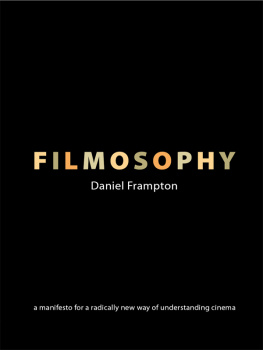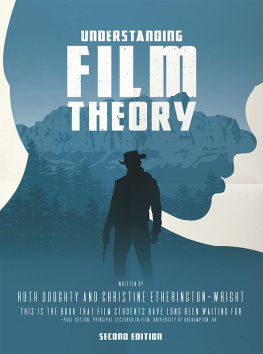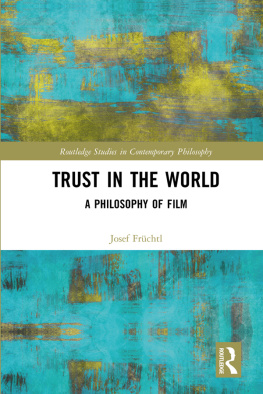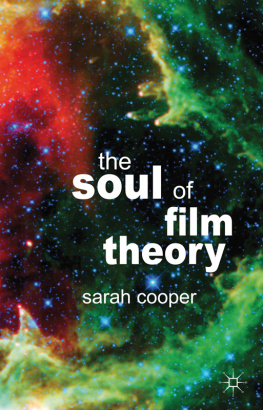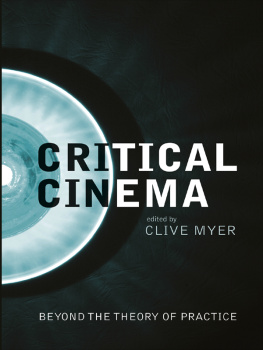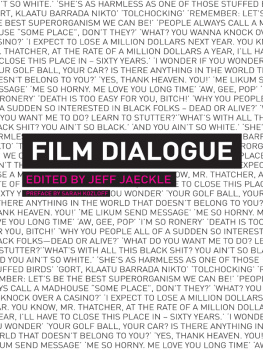Filmosophy
Filmosophy
DANIEL FRAMPTON
WALLFLOWER PRESS
LONDON & NEW YORK
A Wallflower Book Published by
Columbia University Press
Publishers Since 1893
New York Chichester, West Sussex
cup.columbia.edu
Copyright Daniel Frampton 2006
All rights reserved.
E-ISBN 978-1-904-76485-4
A complete CIP record is available from the Library of Congress
ISBN 978-1-904764-85-4 (cloth : alk. paper)
ISBN 978-1-904764-84-7 (pbk. : alk. paper)
ISBN 978-0-231-85010-0 (e-book)
A Columbia University Press E-book.
CUP would be pleased to hear about your reading experience with this e-book at .
contents
For my Mum and Dad
Evelyn and Douglas Frampton
Id like to thank, in a somewhat chronological order:
My fathers father, Frederick Frampton, for being a photographer and passing on his equipment, eventually, to me.
My mother and father, for fairly obvious reasons, and also for great and ineffable reasons.
My brothers, David and Saul, for inexplicable and unprintable reasons.
Two early teachers from Kettering, the artists Bob Pollak and John Pearson.
Colin MacCabe and John O. Thompson, for inspiring and jumpstarting the whole caboodle.
Birkbeck College and the British Film Institute.
The British Academy; Paul, Malcolm and James at Channel Films; and John Sayers at Firefilms, for their financial assistance.
Laura Mulvey, for shaking some sense into the text.
Giles Frampton and Cynthia Clerk, for putting me up.
Ian Christie and Geoffrey Nowell-Smith, for their critiques.
D. N. Rodowick and Lionel Bently, for their encouragement and advice.
Yoram Allon and the team at Wallflower Press.
And my friends Julie Bush, Alison Fydler, Kate Godman, Nick Makasis and Michael Williams, for keeping me going.
London, UK
September 2006
In the summer of 1896 Maxim Gorky attended a screening of the Lumire Cinematograph in Nizhi-Novgorod, Russia, and famously recorded his experience of this early silent black and white projection for a local newspaper:
Last night I was in the Kingdom of Shadows. If you only knew how strange it is to be there. It is a world without sound, without colour. Everything there the earth, the trees, the people, the water and the air is dipped in monotonous grey. Grey rays of the sun across the grey sky, grey eyes in grey faces, and the leaves of the trees are ashen grey. It is not life but its shadow, it is not motion but its soundless spectre.
A hundred years later, on the DVD of Contact, Jodie Foster offers her own commentary on the making of the film, and at one point talks about a simple conversation scene between her character and her love interest, played by Matthew McConaughey. Foster points out, with not a little shock, the fact that the director, Robert Zemekis, had digitally readjusted her facial expression at one point. Zemekis had removed her eyebrow movement in a way to make her character react differently to McConaughey. Foster seemed obviously annoyed not only that her original performance was deemed unsuitable, but that her person had almost been violated by a digital effect: Stop fooling with my face! she says.
Both Gorky and Foster are illustrating a simple fact about cinema: that it has never been, and is definitely becoming less and less, a simple and direct reproduction of reality. Cinema is a world of its own whether a grey soundless shadowy world, or a fluidly manipulatable one. This film-world is a flat, ordered, compressed world; a world that is subtly, almost invisibly organised. A world that is a cousin of reality. And the multiplicity of moving-image media in the twenty-first century means that this film-world has become the second world we live in. A second world that feeds and shapes our perception and understanding of reality. So it seems especially important that we get to grips with the moving image, that we come up with a sufficient range of conceptual frameworks by which to understand it. Because before we can confidently argue a sociology of the cinema we must have an adequate range of moving image philosophies. That is, before we can talk confidently about the social effects of film we first must study the personal affects of film how film affects us directly, emotionally. And both philosophers and film theorists have been doing this since cinema was invented. They have realised that how we engage with film informs and reflects how we engage with reality and that the nature of aesthetic experience, as a form of knowledge, is as valid as rational thought. For Immanuel Kant aesthetic judgement is not a conceptual, intellectual judgement: we are necessarily aesthetic beings with a natural aesthetic emotion and a practical appetite, a rational need, for emotions such as wonder and pleasure. The brain is mobilised by the eye; beauty lies in the eye of the beholder; therefore if beauty is removed, we are removed that is how important aesthetics is to philosophy. We are not aesthetic beings only during some sort of contemplation in front of art works; we are thinking aesthetically all the time framing our friends, meditating on vistas, even while watching television. And the validity of this aesthetic thinking is being proved ever more important in this visually saturated age.
But forget culture and theories and philosophies for just for a moment, and think of film, just film think simply of the personal experience of film: what does it present that we find interesting and thoughtful? What kind of world does it show? Why is it both strange and familiar? What does its separateness and its closeness reveal? We all enjoy film fictions these unmessy, streamlined stories partly because we live a bad wondering script that seems to take a lifetime to get going (perhaps we all secretly want to live a film-life). And I am quite happy to admit that going to the cinema can be a classic wish for escape a daydream drug. The expectation as you arrive and take your seat is part of the pleasure: it is an expectation of enjoyment, of gaining knowledge, of aesthetic rejuvenation, of spectacle and forgetting. And the cinemas darkness seems very necessary for the full encounter between film and filmgoer: we lose our bodies and our minds take over, working alone, locked to the film-world.
And when I leave the cinema I personally often feel drained and confused, almost disconnected, if only for a few moments. Reality now appears random, structureless, chaotic. This blinking return from another world is an experience in itself bearings are found and sustenance is sought (usually at the nearest pub). It takes time for the film to leave my head; and it takes time for reality to become real again time for my mind and body to re-adjust. But some films have a longer, lingering effect: not always an altering, transfiguration of reality, but a gentle continuing inhabitation of our perceptions. Life outside the cinema is released, illuminated, freed-up. Time is elongated and movements magnified my perceptions become images: my eyes become cameras, unafraid to lock onto faces or scenes or moments. Film reveals reality, exactly by showing a distorted mirror of it. Film transforms the recognisable (in a small or large way), and this immediate transfiguration provokes the idea that our thinking can transform our world. The feeling when you step out of the cinema can result in a new realisation, a change, a little knowledge. Why do we feel this way? What does film do to create this feeling? It appears that film, in some of its forms, can rejig our encounter with life, and perhaps even heighten our perceptual powers. Cinema allows us to re-see reality, expanding our perceptions, and showing us a new reality. Film challenges our view of reality, forcing a phenomenological realisation about how reality is perceived by our minds.

